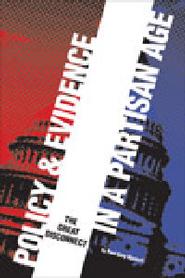
In this atypical approach to issues of public policy in America, Wyckoff rebukes political extremists and claims that both liberals and conservatives have been misled about the effectiveness of public policies. He suggests that the lack of empirical evidence in policy debacles has caused highly partisan politicians to blow policy’s value out of proportion. Short-term fiscal policy, long-term growth policy, education, state and local economic development, and welfare are all brimming with exaggeration, he says. Wyckoff recommends that legislators begin to re-evaluate policy from a different perspective so that future generations will be able to discriminate between research-based theories and biased proposals that reflect an ignorance of statistics.
—John J. Donohue III, Leighton Homer Surbeck Professor of Law, Yale Law School
“Policy and Evidence in a Partisan Age makes a strong case for the provocative claim that public policies have shown little leverage over the most politically salient behaviors. Based on evidence rather than either liberal or conservative ideology, it appears that government has much less opportunity than commonly believed to induce either good or bad behaviors. Stimulating demand during recessions, speeding up national or local economic growth, and increasing children’s human capital through schooling all seem less amenable to government policy than is commonly believed. The author argues that such common beliefs will only be changed if we inculcate better empirical smarts, not just among the lawyers who dominate government, but also among our many undergraduate economics majors who often learn theory divorced from evidence.”
—David L. Weimer, Professor of Public Affairs and Political Science, University of Wisconsin–Madison
Introduction
With the warring between left and right, Democrats and Republicans, advocacy groups on one side and advocacy groups on the other, it seems as if those who set our national agenda are those who shout the loudest. But shouldn’t scholarship count for more than preconceived notions? Policy and Evidence in a Partisan Age debunks myths about economic and social policy while explaining the standards of evidence that should guide our legislation. Author Paul Gary Wyckoff also recommends revisions to economics and law curricula so that the next generation of legislators will know how to craft evidence-based policy derived from research rather than conventional wisdom and theory.Reviews
“While one would hope that legislators and policymakers would base their decisions on the best available empirical evidence, they are instead frequently governed by ideology. Many do not have the knowledge needed to sift through contradictory studies and reevaluate their opinions accordingly. In Policy and Evidence in a Partisan Age, Paul Wyckoff shows his talent for doing just that. His review of empirical research on timely domestic policy concerns demonstrates that many common beliefs about the effects of government action are false. He also makes sensible recommendations that, if followed, will teach policymakers to think in empirical terms.”—John J. Donohue III, Leighton Homer Surbeck Professor of Law, Yale Law School
“Policy and Evidence in a Partisan Age makes a strong case for the provocative claim that public policies have shown little leverage over the most politically salient behaviors. Based on evidence rather than either liberal or conservative ideology, it appears that government has much less opportunity than commonly believed to induce either good or bad behaviors. Stimulating demand during recessions, speeding up national or local economic growth, and increasing children’s human capital through schooling all seem less amenable to government policy than is commonly believed. The author argues that such common beliefs will only be changed if we inculcate better empirical smarts, not just among the lawyers who dominate government, but also among our many undergraduate economics majors who often learn theory divorced from evidence.”
—David L. Weimer, Professor of Public Affairs and Political Science, University of Wisconsin–Madison
Posted May 29, 2009
